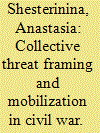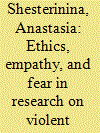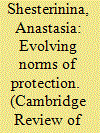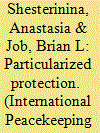|
|
|
Sort Order |
|
|
|
Items / Page
|
|
|
|
|
|
|
| Srl | Item |
| 1 |
ID:
148652


|
|
|
|
|
| Summary/Abstract |
Research on civil war mobilization emphasizes armed group recruitment tactics and individual motivations to fight, but does not explore how individuals come to perceive the threat involved in civil war. Drawing on eight months of fieldwork with participants and nonparticipants in the Georgian-Abkhaz war of 1992–93, this article argues that social structures, within which individuals are embedded, provide access to information critical for mobilization decisions by collectively framing threat. Threat framing filters from national through local leadership, to be consolidated and acted on within quotidian networks. Depending on how the threat is perceived—whether toward the self or the collectivity at its different levels—individuals adopt self- to other-regarding roles, from fleeing to fighting on behalf of the collectivity, even if it is a weaker actor in the war. This analysis sheds light on how the social framing of threat shapes mobilization trajectories and how normative and instrumental motivations interact in civil war.
|
|
|
|
|
|
|
|
|
|
|
|
|
|
|
|
| 2 |
ID:
165448


|
|
|
|
|
| Summary/Abstract |
The discussion of ethics in the social sciences focuses on ‘doing no harm’ and ‘giving back’ to research participants, but does not explore the challenges of empathy and fear in research with participants in political violence and war. Drawing on 180 in-depth interviews on the Georgian–Abkhaz war of 1992–93 collected over eight months between 2010 and 2013 primarily in Abkhazia, but also Georgia and Russia, I argue that researchers can come to empathize with some but fear other participants in past and present violence. These emotional responses can influence researchers’ ability to probe and interpret interviews and respondents’ ability to surpass strong positions to explore dilemmas of participation in violence. By empathizing with not only ‘victims’ and ‘non-fighters’ as I had expected based on my pre-existing moral-conceptual categories, but also participants in the war, I found that individuals adopted multiple overlapping roles and shifted between these roles in the changing conditions of violence. In contrast, failing to empathize with and fearing those who continued to participate in violence after the war of 1992–93 limited my ability to fully appreciate the complexity of their participation, but shed light on the context of violence in contemporary Abkhazia. This analysis shows that reflection on the role of empathy and fear in shaping our interactions with research participants can help advance our understanding of participation in violence and this difficult research context.
|
|
|
|
|
|
|
|
|
|
|
|
|
|
|
|
| 3 |
ID:
151294


|
|
|
|
|
| Summary/Abstract |
This article examines the influence of civilian protection norms on China’s response to the 2011 crisis in Libya. It argues that Responsibility to Protect—an emerging norm commonly associated with the Libyan case—did not play a major role in China’s abstention on Resolution 1973 (2011) authorizing international intervention in Libya. For China, Responsibility to Protect is merely a concept and could not serve as the basis for intervention. Instead, Protection of Civilians in Armed Conflict, as a normative foundation for civilian protection endorsed by China, offers a more appropriate lens for understanding China’s vote. Protection of Civilians, however, does not accommodate China’s unprecedented evacuation of Chinese nationals from Libya. This operation proceeded from a third logic of Protection of Nationals Abroad, which poses dilemmas for China’s strict adherence to the principles of sovereignty and non-interference and brings to bear domestic interests and notions of protection.
|
|
|
|
|
|
|
|
|
|
|
|
|
|
|
|
| 4 |
ID:
143796


|
|
|
|
|
| Summary/Abstract |
The protection of civilians at risk in armed conflict has, since the late 1990s, become institutionalized at the United Nations (UN), gaining acceptance as a normative rationale for UN peacekeeping. However, the bulk of civilians in need of protection in armed conflict are unlikely to attain it. The article develops an argument on ‘particularized protection' – particularized in that UN Security Council (SC) mandates are formulated and adjusted over time to direct mission protection to specific subsets of civilian populations, that is, those relevant to the UN itself, the host state, other states, NGOs and the media, leaving most local civilians receiving little effective protection. Particularized protection, we argue, is a result of the institutional dynamics involving actors producing mandates – the UNSC – and those providing protection – peacekeeping missions – whereby mandates are specified to direct mission protection to selected, particularized groups. We demonstrate these dynamics in two cases, Côte d'Ivoire and Somalia.
|
|
|
|
|
|
|
|
|
|
|
|
|
|
|
|
|
|
|
|
|